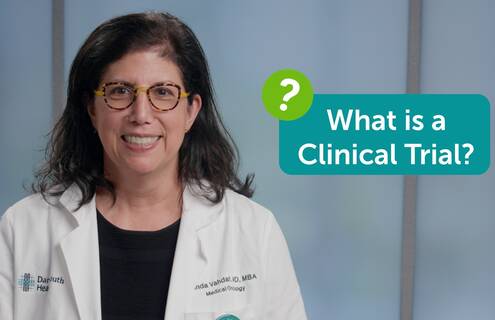
In this Q&A, renowned breast oncologist and clinical researcher Linda Vahdat, MD, answers common questions about the importance of clinical trials, the safety considerations involved, and the potential benefits for patients, and clears up some common myths and misconceptions.
Q: What is a clinical trial?
Vahdat: A clinical trial is a research study that is carefully designed to answer a particular clinical question. Clinical trials are very structured so that at the end of it, we can make a definitive assessment of what we just studied. Clinical trials are essential to moving the care of our patients forward. They do this by evaluating new treatment approaches. While there are different types of clinical trials, many involve comparing an investigational drug to the current standard of care. When the study concludes, we’ll be able to say whether the investigational agent is better than the standard of care.
{"preview_thumbnail":"/sites/default/files/styles/video_embed_wysiwyg_preview/public/video_thumbnails/esxTpremgsw.jpg?itok=e1fUZu5V","video_url":"https://www.youtube.com/watch?v=esxTpremgsw","settings":{"responsive":1,"width":"854","height":"480","autoplay":0},"settings_summary":["Embedded Video (Responsive)."]}
Q: What happens during a clinical trial?
Vahdat: The approval process for new treatments or new treatment approaches can actually take up to 20 years. During that time, the drug is studied, its side effects are well characterized, and the patients we think might benefit are also well characterized. The last step of a clinical trial is called a Phase III clinical trial. During that phase, we study the investigational agent versus the standard of care. If the investigational drug is better than the standard of care, it raises the bar to become the new standard.
{"preview_thumbnail":"/sites/default/files/styles/video_embed_wysiwyg_preview/public/video_thumbnails/wgLLnRgsoAc.jpg?itok=BSwNBKrL","video_url":"https://www.youtube.com/watch?v=wgLLnRgsoAc","settings":{"responsive":1,"width":"854","height":"480","autoplay":0},"settings_summary":["Embedded Video (Responsive)."]}
Q: How safe are clinical trials?
Vahdat: Clinical trials undergo rigorous safety evaluations before being approved. Investigational drugs are thoroughly studied to understand their potential side effects, optimal dosages, and which patients might benefit. Once enrolled, patients who participate in clinical trials are monitored very closely, which can often lead to earlier detection and management of any adverse effects.
{"preview_thumbnail":"/sites/default/files/styles/video_embed_wysiwyg_preview/public/video_thumbnails/nS0mQKCYyPk.jpg?itok=KND1Gw4h","video_url":"https://www.youtube.com/watch?v=nS0mQKCYyPk","settings":{"responsive":1,"width":"854","height":"480","autoplay":0},"settings_summary":["Embedded Video (Responsive)."]}
Q: What are some common myths about clinical trials?
Vahdat: Common misconceptions about clinical trials that I want to clear up—because I often hear them when I talk to patients—are the notions that clinical trials have a placebo and that a patient is a “Guinea pig.” There are many different kinds of clinical trials, but the trials we run do not have a placebo or a sugar pill, and patients are not “Guinea pigs.” Especially in oncology, years of rigorous study must be completed successfully before we even get to the clinical trial phase. By then, we know exactly what dose of drug we need to use, we have a very good idea about the side effects, and we're really looking to really understand if it works better than other available treatments.
Q: Why should I participate in a clinical trial?
Vahdat: There are many reasons why someone should participate in a clinical trial, but I think the most important piece is that it's been proven that patients who participate in clinical trials have better outcomes than those who don't participate. There have been lots of studies looking at why patients might do better in clinical trials vs. not in clinical trials. The improved outcomes may be because of closer monitoring or access to new technology. I always think about participating in clinical trials as having access to drugs before they are FDA-approved, so you're sort of a step ahead. That said, it's always really important to speak to your provider to find out if a clinical trial is for you.
{"preview_thumbnail":"/sites/default/files/styles/video_embed_wysiwyg_preview/public/video_thumbnails/r4qkc5UcgOk.jpg?itok=xwTTWcEh","video_url":"https://www.youtube.com/watch?v=r4qkc5UcgOk","settings":{"responsive":1,"width":"854","height":"480","autoplay":0},"settings_summary":["Embedded Video (Responsive)."]}